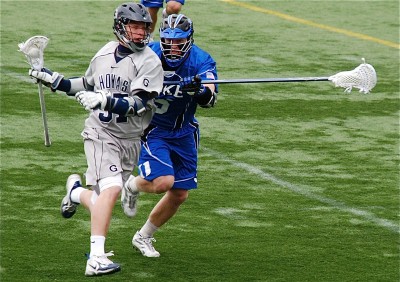
You remember the Duke University lacrosse scandal, right? In 2006, Duke canceled its lacrosse season after three players were accused of sexually assaulting an African-American stripper at an off-campus party. The allegations led to the resignation of beloved Duke lacrosse coach Mike Pressler and the indictment of three white, wealthy lacrosse players.
But do you remember the result of the case? I, for one, must admit that before the ESPN “30 for 30” film “Fantastic Lies” aired earlier in March, I couldn’t have told you if the players were in jail or if they were exonerated. Honestly, if you asked me about the Duke lacrosse case just a few months ago, I probably would’ve said, “Oh yeah. They were guilty, right?”
I just remembered the case as such a huge media circus that I ignorantly assumed they were guilty without knowing any of the facts. And I was not alone.
The documentary, directed by Marina Zenovich, portrays a culture of privilege and entitlement among the lacrosse team. A popular group of guys on campus, the team is basically a fraternity, with a reputation for throwing great parties and drinking probably more than Division I lacrosse players should.
But on March 13, 2006, everything changes. It’s spring break at Duke and with most of campus gone, the lacrosse players pay for two strippers to come perform at their house. One of the strippers, Crystal Mangum, later accuses three players — Reade Seligmann, Collin Finnerty and captain Dave Evans — of rape, and then all hell breaks loose at Duke.
Back to hoops after I was sidetracked by #FantasticLies – jaw still on floor after watching it. Highly suggest you watch if you haven't.
— Dari Nowkhah (@ESPNDari) March 28, 2016
There are campus protests, a column in the local paper pleading for the players to tell the truth, a lacrosse team staying silent and a prosecutor, Mike Nifong, moving the case forward as he campaigns to hold his title of Durham County District Attorney.
The case leads to a nationwide debate on race, class and wealth, and it strengthens the already existing divide between poverty-ridden Durham and Duke, the “Harvard of the South.”
But what are the facts? The whole community was quick to condemn the lacrosse players. They were just as quick to label it a hate crime. And they swiftly judged without even looking into Mangum or Nifong at all.
Zenovich gives the point of view from a few members of the team, parents of the accused, lawyers, journalists and various Duke professors. She includes footage from the trial, the riots on campus and press conferences with the accused. There is even the poignant inclusion of Evans’ emotional speech calling the accusations “fantastic lies.”
Personally, I loved the perspective the parents of the accused added to the film. Kevin Finnerty, Collin’s father, and Kathy Seligmann, Reade’s mother, drove the story along as they recounted their sons’ reactions with emotion and clarity. But perhaps the best interview of the film came from Jay Bilas, a Duke basketball alumnus and current ESPN basketball analyst.
Bilas, who received his J.D. from Duke University Law School in 1992, wrote a letter to the editor of Duke Magazine calling for the resignation of the school’s president. He felt the university did not act appropriately in protecting the rights of its students and instead let a media storm cloud the facts.
But Bilas also admits the players probably shouldn’t have hired strippers for their party.
https://twitter.com/jonah_moore/status/714203510477340672
This is, in my estimation, one of the main points of the film. You can admonish a group for inappropriate behavior, but also separate that from the facts of a serious alleged crime.
So what really happened at that party in March 2006? We’ll never know exactly, but according to one neighbor, there were racial slurs uttered at the girls. There was an exotic dancer, seemingly on some substance, passed out on the back steps of the house. But there was no hard evidence of a sexual assault. In fact, the evidence, most notably DNA results and the defense’s timeline, pointed to the boys’ innocence.
And that’s what got lost in the court of public opinion.
I’m not surprised that the three players declined to be interviewed for the documentary. It’s been 10 years, and they probably distrust the media after Nifong, who was disbarred, intentionally ignored evidence to try to put the players behind bars.
Nifong even set up a police lineup that was riddled with Duke lacrosse players, meaning that whoever Mangum picked would be a winner for the case and align with her story.
I encourage anyone who hasn’t seen “Fantastic Lies” to check it out. It was riveting, even though we knew the ending. But just imagine if these kids didn’t have the financial resources to fight the charges and had to take a plea deal that wasn’t in their favor.
This would’ve been a totally different story.


An early red flag was that while Nifong hyped the race angle (during an election in which he started out almost 20 points behind in the polls), he refused to actually add hate crimes charges.
Those are federal charges and would have brought in the FBI — and outside investigation.
Instead, it was the players — the accused — who were almost literally begging for the FBI to investigate (which would be odd if they were guilty and wanted more investigators).